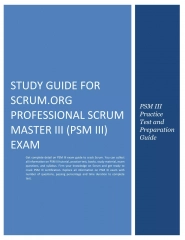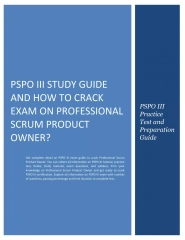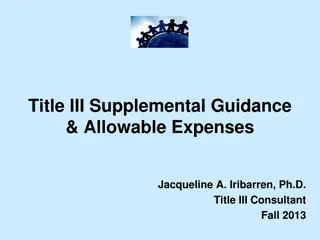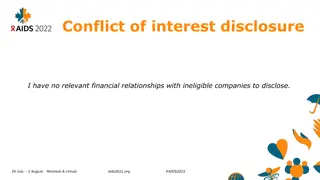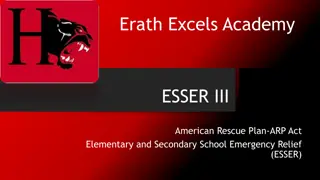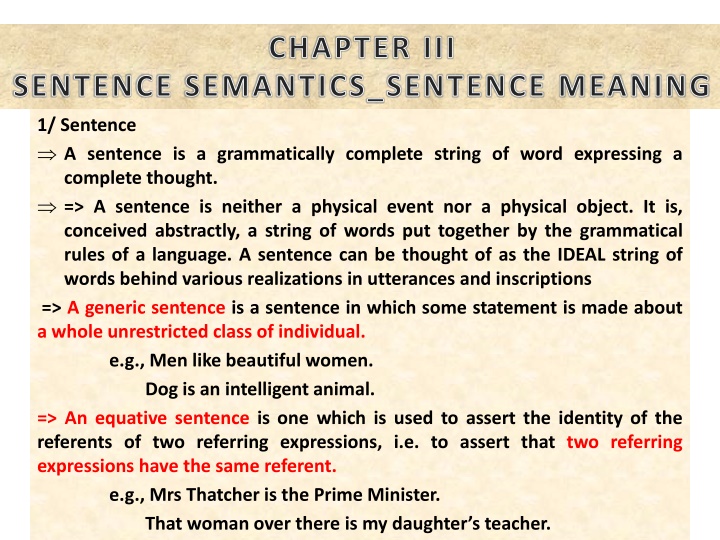
Sentence Semantics and Meaning
Explore the essence of sentences - from grammatical completeness to semantic roles played by different parts like predicators and arguments. Discover the nuances of propositions and utterances in this insightful overview.
Download Presentation

Please find below an Image/Link to download the presentation.
The content on the website is provided AS IS for your information and personal use only. It may not be sold, licensed, or shared on other websites without obtaining consent from the author. If you encounter any issues during the download, it is possible that the publisher has removed the file from their server.
You are allowed to download the files provided on this website for personal or commercial use, subject to the condition that they are used lawfully. All files are the property of their respective owners.
The content on the website is provided AS IS for your information and personal use only. It may not be sold, licensed, or shared on other websites without obtaining consent from the author.
E N D
Presentation Transcript
CHAPTER III SENTENCE SEMANTICS_SENTENCE MEANING 1/ Sentence A sentence is a grammatically complete string of word expressing a complete thought. => A sentence is neither a physical event nor a physical object. It is, conceived abstractly, a string of words put together by the grammatical rules of a language. A sentence can be thought of as the IDEAL string of words behind various realizations in utterances and inscriptions => A generic sentence is a sentence in which some statement is made about a whole unrestricted class of individual. e.g., Men like beautiful women. Dog is an intelligent animal. => An equative sentence is one which is used to assert the identity of the referents of two referring expressions, i.e. to assert that two referring expressions have the same referent. e.g., Mrs Thatcher is the Prime Minister. That woman over there is my daughter s teacher.
2/ Utterance => An utterance is any stretch of talk by one person before and after which there is silence on the part of that person. => An utterance is the USE by a particular speaker, on a particular occasion, of a piece of language, such as a sequence of sentences, or a single phrase, or even a single word. => Utterances are physical events. Accent and voice quality strictly belong to utterances, not to the sentence uttered. => compare sentences to utterances 3/ Proposition => The notion of a proposition is central to semantics. => A proposition is that part of meaning of the utterance of a declarative sentence which describes some state of affairs. The state of affairs typically involves persons or things referred to by expressions in the sentence. In uttering a declarative sentence a speaker typically asserts a proposition. Corresponding declaratives and interrogatives (and imperatives) have the same propositional content. (Hurford, page 21) e.g: Go away, will you? I am an idiot. You will go away. Am I an idiot? (the same propositional content) But NOT Pigs might fly. I m a Dutchman. (not the same)
4/ Predicators and Predicates 4.1/ The Predicator of a simple declarative sentence is the word or sometimes a group of words which does not belong to any of the referring expressions and which, of the remainder, makes the most specific contribution to the meaning of the sentence. e.g., I am hungry. (hungry -> predicator) (1) _ adjective Joe is in San Francisco. (in -> predicator) (2) _ preposition Mummy is asleep. (asleep -> predicator) (3) _ adjective The Royal Scottish Museum is behind Old College. (behind -> predi.) (4) _ prep Einstein was a genius. (genius -> predicator) (5) _ noun The white man loved the Indian maiden. (love -> predicator) _ verb Jimmy was waiting for the downtown bus. (wait for -> predicator) _ verb Note: 1/ The verb BE in its various forms (am, is, are, was, were) is NOT the predicator in any example sentences (1), (2), (3), (4), (5). 2/ The predicators in sentences can be of various parts of speech: adjectives, verbs, prepositions and nouns. Words of other parts of speech, such as conjunctions, articles CANNOT serve as predicators in sentences.
=> The semantic analysis of simple declarative sentence reveals two major semantic roles played by different subparts of the sentence. These are the role of predicator and the role(s) of argument(s) played by the referring expression(s) Arguments (A) played by the referring expression(s). Proposition = (A) - P - (A) e.g: Mrs. Wright is writing the Mayor s speech. (A) (P) Dennis is a menace. (A) (P) Hamish showed Morag his sporran. (A) (P) show (A) (A) Donald is proud of his family. (A) (P) (A) The hospital is outside the city. (A) (P) (A) 4.2/ A Predicate is any word (or sequence of words) which (in a given single sense) can function as the predicator of a sentence. e.g: hungry, in, asleep, behind, genius, love, wait for, bottle, dusty, woman etc... are predicates. BUT you, Fred, and, or, but, not are not predicates (A)
4.3/ Comparison between Predicates and Predicators A simple sentence only has one predicator although it may well contain many other words (predicates). These words (predicates) can function as predicators in other sentences. e.g: A tall, handsome stranger entered the saloon. -> only one predicator: enter -> many other words: tall, handsome, stranger, saloon are predicates and can function as predicators in other sentences; for example: John is tall, He is handsome, He is a stranger, and That building is a saloon. 4.4/ The degree of a predicate -> is a number indicating the number of arguments it is normally understood to have in simple sentences. 4.4.1/ One-place predicate: a verb with just one argument. e.g: John sneezed. Mummy is asleep Note: Most adjectives and nouns are one-place predicates.(p.49&50 Hurford) e.g: Cairo is dusty (A) (P) Cairo is a large city. (A) (P)
4.4.2/ Two-place predicate: a verb with just two arguments, one as its subject and one as its object. e.g: Keith made this toy. John saw Mary. (A) (P) (A) (A) (P) (A) 4.4.3/ Three-place pred.: there are a few; the verb give is the best example. e.g: Herod gave Salome a nice present. (A) (P) (A) (A) Note: Preps can be two or three-place predicates. (p.49, Hurford) e.g: Cairo is in Africa. (two-place predicate) (A) (P) (A) Your marble is under my chair. (two-place predicate) (A) (P) (A) Dundee is between Aberdeen and Edinburgh. (three-place predicate) (A) (P) (A) (A) Prepositions collocated with some adjectives such as afraid of, different from etc. are NOT themselves predicates. (p. 50, Hurford) 5/ Sense properties An analytic sentence (A) is one that is necessarily TRUE, as a result of the senses of the words in it.
A synthetic sentence (S) is one which may be either TRUE or FALSE, depending on the way the word is. A contradictory sentence (C) is a sentence that is necessarily FALSE, as a result of the senses of the words in it. 6/ Sense relations involving sentences 6.1/ Paraphrase a sentence which expresses the same proposition as another sentence is a paraphrase of that sentence. => The relation of synonymy can lead to the relation of paraphrase. e.g: Bachelors prefer red-haired girls is a paraphrase of Girls with red hair are preferred by unmarried men. 6.2/ Entailment => Hyponymy can lead to the relation of entailment. e.g: I saw a boy => I saw a person. John boiled an egg => John cooked an egg.



